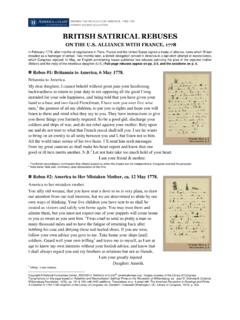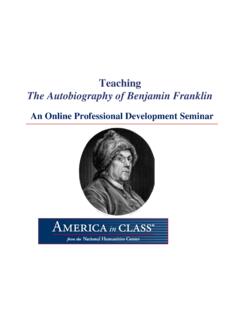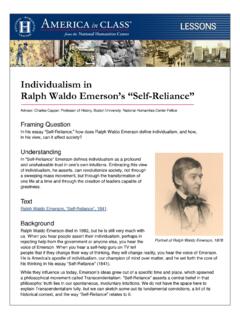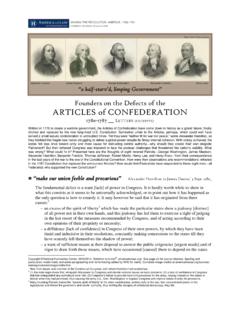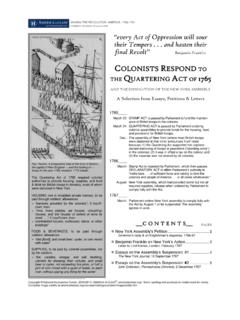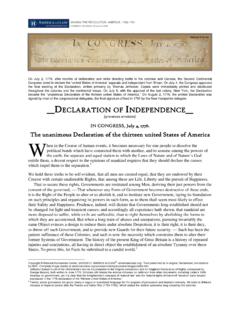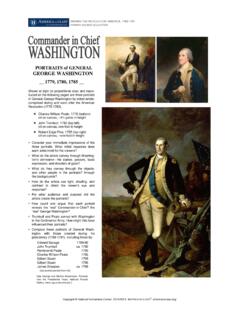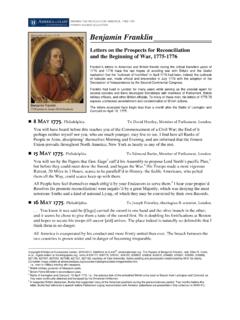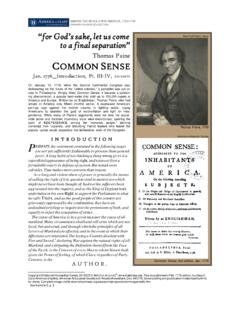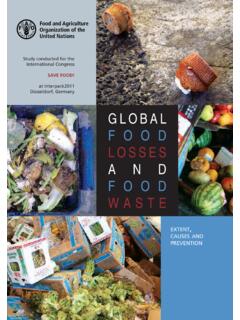Transcription of COMMON SENSE FULL TEXT “for God’s ... - America in Class
1 LESSON: THOMAS PAINE, COMMON SENSE , 1776 FULL TEXT for God s sake, let us come to a final separation Thomas Paine COMMON SENSE *January 1776 Presented here is the full text of COMMON SENSE from the third edition (published a month after the initial pamphlet), plus the edition Appendix, now considered an integral part of the pamphlet s impact. I N T R O D U C T I O N 1 PERHAPS the sentiments contained in the following pages are not yet sufficiently fashionable to procure them general favor. A long habit of not thinking a thing wrong gives it a superficial appearance of being right, and raises at first a formidable outcry in defense of custom.
2 But the tumult soon subsides. Time makes more converts than reason. 2 As a long and violent abuse of power is generally the Means of calling the right of it in question (and in Matters too which might never have been thought of, had not the Sufferers been aggravated into the inquiry), and as the King of England hath undertaken in his own Right to support the Parliament in what he calls Theirs, and as the good people of this country are grievously oppressed by the combination, they have an undoubted privilege to inquire into the preten-sions of both, and equally to reject the usurpation of either. 3 In the following sheets, the author hath studiously avoided everything which is personal among ourselves.
3 Compliments as well as censure to individuals make no part thereof. The wise and the worthy need not the triumph of a pamphlet; and those whose sentiments are injudicious or unfriendly will cease of themselves unless too much pains are bestowed upon their conversion. 4 The cause of America is in a great measure the cause of all mankind. Many circumstances hath and will arise which are not local, but universal, and through which the principles of all Lovers of Mankind are affected, and in the Event of which their Affections are interested. The laying a Country desolate with Fire and Sword, 1 declaring War against the natural rights of all Mankind, and extirpating [destroying] the Defenders thereof from the Face of the Earth, is the Concern of every Man to whom Nature hath given the Power of feeling, of which Class , regardless of Party Censure, is the A U T H O R.
4 America IN Class : Copyright 2014 National Humanities Center. Text from 3d. ed. (Bradford) of February 14, 1776, courtesy of Early American Imprints, American Antiquarian Society with Readex/NewsBank, #43116. Some spelling and punctuation modernized by NHC for clarity. Bracketed comments, pull-quotes, and numbered footnotes added by NHC. Paine s original footnotes designated by asterisks. 1 See footnote 14, New York Public Library Thomas Paine American Antiquarian Society COMMON SENSE , first edition, January 1776 National Humanities Center Thomas Paine, COMMON SENSE , 1776, 3d ed.
5 , full text incl. Appendix 2 _____COMMON SENSE_____ I. OF THE ORIGIN AND DESIGN OF GOVERNMENT IN GENERAL, WITH CONCISE REMARKS ON THE ENGLISH ONSTITUTION. 5 SOME writers have so confounded society with government as to leave little or no distinction between them; whereas they are not only different but have different origins. Society is produced by our wants, and government by our wickedness; the former promotes our happiness positively by uniting our affections, the latter negatively by restraining our vices. The one encourages [social] intercourse, the other creates distinctions. The first is a patron, the last a punisher.
6 6 Society in every state is a blessing, but government, even in its best state, is but a necessary evil; in its worst state an intolerable one: for when we suffer, or are exposed to the same miseries by a government, which we might expect in a country without government, our calamity is heightened by reflecting that we furnish the means by which we suffer. Government, like dress, is the badge of lost innocence; the palaces of kings are built upon the ruins of the bowers of paradise. For were the impulses of conscience clear, uniform and irresistibly obeyed, man would need no other lawgiver; but that not being the case, he finds it necessary to surrender up a part of his property to furnish means for the protection of the rest; and this he is induced to do by the same prudence which in every other case advises him, out of two evils, to choose the least.
7 Wherefore, security being the true design and end of government, it unanswerably follows that whatever form thereof appears most likely to ensure it to us, with the least expense and greatest benefit, is preferable to all others. 7 In order to gain a clear and just idea of the design and end of government, let us suppose a small number of persons settled in some sequestered part of the earth, unconnected with the rest; they will then represent the first peopling of any country, or of the world. In this state of natural liberty, society will be their first thought. A thousand motives will excite them thereto; the strength of one man is so unequal to his wants, and his mind so unfitted for perpetual solitude, that he is soon obliged to seek assistance and relief of another, who in his turn requires the same.
8 Four or five united would be able to raise a tolerable dwelling in the midst of a wilderness, but one man might labor out the COMMON period of life without accomplishing anything. When he had felled his timber he could not remove it, nor erect it after it was removed. Hunger in the meantime would urge him from his work, and every different want call him a different way. Disease, nay even misfortune, would be death; for though neither might be mortal, yet either would disable him from living, and reduce him to a state in which he might rather be said to perish than to die. 8 Thus necessity, like a gravitating power, would soon form our newly arrived emigrants into society, the reciprocal blessings of which would supersede, and render the obligations of law and government unnecessary while they remained perfectly just to each other.
9 But as nothing but heaven is impregnable to vice, it will unavoidably happen that in proportion as they surmount the first difficulties of emigration, which bound them together in a COMMON cause, they will begin to relax in their duty and attachment to each other: and this remissness will point out the necessity of establishing some form of government to supply the defect of moral virtue. COMMON TERMS in COMMON SENSE charter constitution check limit, keep under certain controls posterity future generations; our children suffer permit, allow viz. that is, namely want lack, need the Continent the thirteen colonies foreign courts other monarchs and their advisers republican of a republic/representative democracy (not a political party) Tories; Whigs Loyalists; Patriots National Humanities Center Thomas Paine, COMMON SENSE , 1776, 3d ed.
10 , full text incl. Appendix 3 9 Some convenient tree will afford them a State House [legislative building], under the branches of which the whole colony may assemble to deliberate on public matters. It is more than probable that their first laws will have the title only of REGULATIONS, and be enforced by no other penalty than public disesteem. In this first parliament every man, by natural right, will have a seat. 10 But as the colony increases, the public concerns will increase likewise, and the distance at which the members may be separated will render it too inconvenient for all of them to meet on every occasion as at first, when their number was small, their habitations near, and the public concerns few and trifling.
